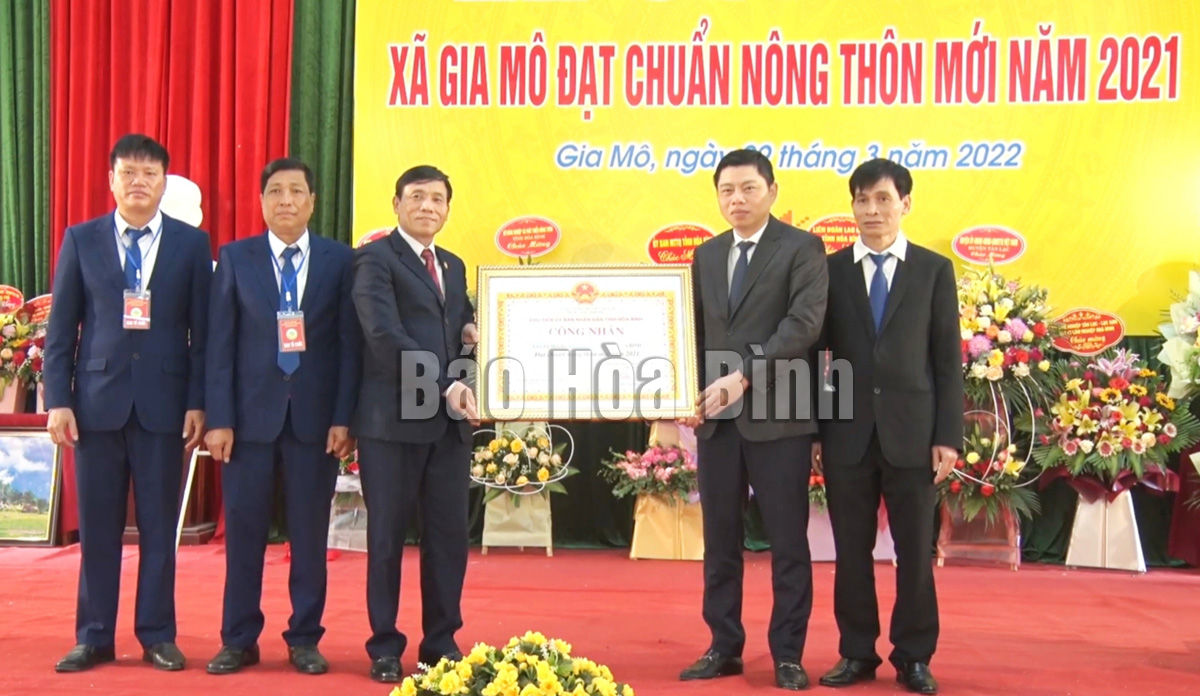



Under the authorization of the Chairman of the Provincial People's Committee, the leaders of the Provincial Fatherland Front Committee are awarding the certificate recognizing the standard of the new rural area to Gia Mo commune.
Accordingly, after more than 10 years of implementing the program, Gia Mo commune has mobilized a total capital of over 110 billion VND to invest in building the socio-economic infrastructure, supporting production and other tasks. In particular, the people have voluntarily donated over 23,350 m2 of land of all kinds, thousands of working hours, contributing over 12 billion VND to build the new rural area. Up to now, in the commune there is a fairly spacious system of rural transportation, irrigation, electricity, schools, health stations, and cultural facilities, with 100% of the communal and inter-communal roads and 72.5% of the main roads of the hamlets and villages have been plasticized and concreted; 100% of the alleys are clean without mud in the rainy season. The canals have been solidified at 61%, helping the production area to be irrigated to over 80%. There are 2 out of the 2 schools meeting the national standards in the commune. In the area there are no temporary and dilapidated houses; nearly 90% of the households have the standard housing; 85% of the households have achieved the title of the cultural family.
In economic development, the households have been promoting the restructure of crops and livestock to improve the production efficiency. The whole commune has converted over 15 hectares of inefficient rice cultivation into other crops of high economic value. At the same time, the social security policies have been paid attention to be implemented; the security and order have been maintained; the people's living standards are improving day by day. By the end of 2021, the average income of the commune reached 36.6 million VND/person; the rate of the poor households decreased to 10.1%...
For Quyet Chien commune, when starting the implementation of the National Target Program on building new rural areas, there were only 4 out of the 19 criteria achieved. However, with the joint effort and consensus of the whole political system, the consensus of the people, together with the investment resources of the State and the support of all levels, the commune has overcome many difficulties and obstacles in implementing the program. From 2011 to 2021, the total mobilized resources and the integrated capital for implementing the Program of building the the New Rural area of the commune reached over 58,800 million VND. In which, the capital contributed by the People in cash, working days, donating land and properties on land and other materials converted into money was nearly 16 billion VND, accounting for more than 26% of the total capital. From the investment resources, the rural infrastructure, especially electricity, roads, schools, stations and cultural institutions have been built to basically meet the people's needs and help. The socio-economic development.
Economically, the commune has focused on developing commodity-oriented production, actively changing the structure of crops with high productivity and economic efficiency. At the same time, the models linking production with the consumption market have been developed. In which, the highlight is the model of growing safe vegetables such as chayote, white radish, etc. In 2021, Quyet Chien's per capita income reached 36.5 million VND, increasing 26 million VND compared to that of 2011. The rate of poor households decreased to 11.48%, the near-poor households decreased to over 17%. The percentage of thye households meeting cultural standards reached 87%...
On this occasion, the People's Committee of Tan Lac district and the People's Committee of 2 communes, Gia Mo and Quyet Chien, praised and rewarded many collectives and individuals with the outstanding achievements in implementing the Program of the National Environment on building the new countryside.